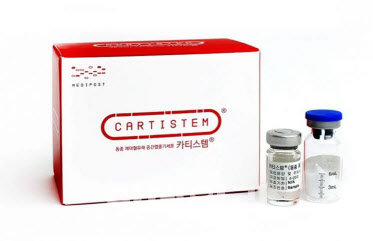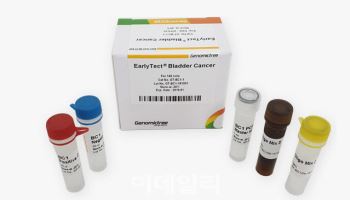Unauthorized reproduction or distribution is illegal and subject to criminal penalties.
Pharm Edaily enforces a zero-tolerance policy and will take strict action.
[NA Eun-kyung, Edaily Reporter] On July 2, biotech and healthcare stocks moved quietly overall with no stocks hitting limit-up or limit-down thresholds. But investor sentiment diverged around upcoming FDA-related events. Shares of Medipost declined amid market concerns over potential fundraising ahead of a critical U.S. clinical trial. In contrast, CorestemChemOn, which had faced scrutiny for a failed Phase 3 trial, rebounded after regaining its certification as an innovative pharmaceutical company. Meanwhile, Intron Biotechnology surged double digits following positive U.S. patent developments that boosted expectations for future license-out opportunities.
Medipost Falls on Funding Concerns Ahead of U.S. Phase 3 Trial Medipost shares dropped 9.8% to 11,950 won after reports emerged that the company was preparing to raise around 100 billion won through a rights offering.
 | | Medipost ‘CARTISTEM’ (Source: Medipost) |
|
The stem cell biotech, founded in 2000 by former Samsung Medical Center professor Yoon Sun Yang, is currently conducting Phase 3 trials of its lead osteoarthritis treatment Cartistem in Japan and the United States. The Japan trial is nearing completion, while the U.S. trial is slated to submit its IND application by year-end.
Market observers believe the stock slump reflects concerns over the high costs of the U.S. trial, especially as reports surfaced that the company had begun distributing teaser letters to potential investors.
A Medipost official said, “We are reviewing investment options to secure sufficient cash ahead of clinical trials in the U.S. and Japan, but the amount and timing have not been finalized.”
Cartistem was the second stem cell therapy approved in Korea back in 2012. The product gained public attention when former national football coach Guus Hiddink underwent bilateral knee surgery using Cartistem in 2014 and 2022. More recently, Medipost hosted a “Train-the-Trainer” program in Korea for renowned U.S. team physicians specializing in cartilage regeneration from the NBA and MLB to observe Cartistem procedures firsthand.
CorestemChemOn Rebounds Ahead of FDA Meeting CorestemChemOn shares rose nearly 16% intraday to 3,090 won after the company announced it had regained its status as an Innovative Pharmaceutical Company, a government designation offering various regulatory and financial benefits?such as R&D grant scoring boosts, tax and pricing incentives, access to policy funding, and relaxed facility requirements.
The re-certification is rare for previously designated firms and comes as a welcome development after a tough year. In 2023, CorestemChemOn’s ALS therapy Neuronata-R failed to meet its primary endpoint in a Phase 3 trial conducted under the oversight of both the Korean MFDS and the U.S. FDA, sending its shares into a steep decline. The failed trial had raised concerns about potential difficulties in securing out-licensing deals and future funding.
The company now sees the re-certification as a credibility boost. “The designation will help us offset unexpected risks over the next three years,” a company official said.
CorestemChemOn is also adjusting its regulatory strategy. In April, it filed a supplemental application with the MFDS, targeting slow progressor ALS patients using subgroup data on ALSFRS-R scores, composite survival indices (CAFS), and forced vital capacity (SVC). The company expects a response requesting data clarification soon.
In the U.S., CorestemChemOn is preparing for an FDA Type C meeting slated for October. “We’re preparing up to 10 key questions in coordination with our CRO and analyzing our data,” the official said. “We are referencing Biogen’s Tofersen, which received accelerated FDA approval based on biomarker-driven evidence similar to what Neuronata-R has shown.”
Intron Biotechnology Surges on Patent Filing for Key Pipeline Intron Biotechnology soared 16.1% to close at 4,285 won after announcing that it had filed a U.S. patent for three modified endolysin-based drug candidates showing strong antimicrobial activity against gram-negative and super bacteria.
The compounds―PKL200, TSL2200, and EAL2200―were derived from its ‘itLysin’ platform under the GN200 development program. According to the company, itLysin enhances permeability through the outer membrane of gram-negative bacteria, a longstanding barrier that traditional antibiotics often fail to overcome.
“Infections caused by gram-negative pathogens are on the rise globally, yet conventional antibiotics struggle to penetrate the outer membrane,” the company said. “Our candidates are engineered to overcome that limitation.”
Vice President Sang-Hyun Kang of Intron Bio’s Biotechnology Research Center emphasized the commercial strategy behind the filing. “Unlike previous approaches that prioritized filing early, this was a calculated move after thorough business preparation,” he said. “This secures both IP rights and technology confidentiality.”
Despite recent setbacks including a second license revocation of its core asset SAL200 Intron remains focused on improving SAL200’s production yield in hopes of reviving out-licensing potential.
Let me know if you‘d like this formatted into a press release or included with stock price charts.










